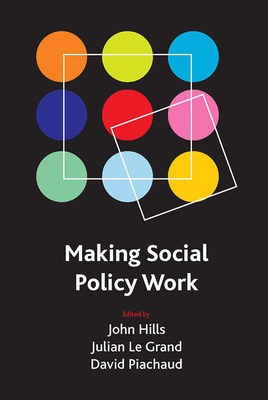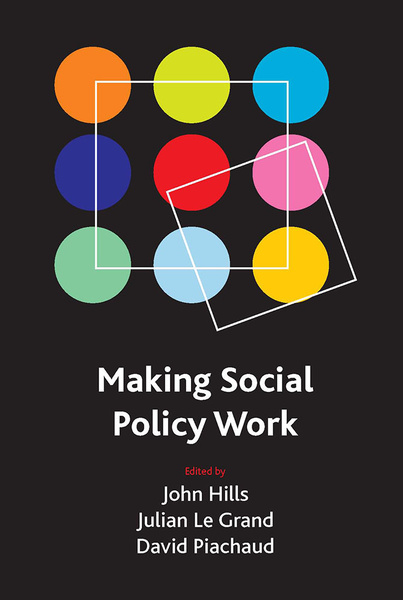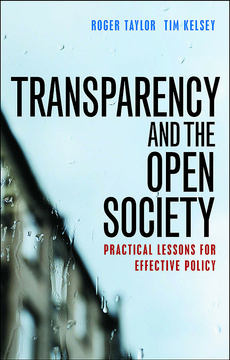Making social policy work
Edited by John Hills, Julian Le Grand and David Piachaud
ISBN
978-1861349576Dimensions
234 x 156 mmImprint
Policy PressISBN
978-1861349583Dimensions
234 x 156 mmImprint
Policy PressISBN
978-1447370147Imprint
Policy PressSocial policy is now central to political debate in Britain. What has been achieved by efforts to improve services and reduce poverty? What is needed to deliver more effective and popular services to all and increase social justice? How can we make social policy work? These are some of the questions discussed in this new and wide-ranging collection of essays by a distinguished panel of leading social policy academics.
The book covers key issues in contemporary social policy, particularly concentrating on recent changes. It examines the history and goals of social policy as well as its delivery, focusing in turn on the family and the state, schools, higher education, healthcare, social care, communities and housing. Redistribution is also examined, exploring child poverty, pension reform and resources for welfare.
The essays in this collection have been specially written to honour the 70th birthday of Howard Glennerster whose pioneering work has been concerned not only with the theoretical, historical and political foundations of social policies but, crucially, with how they work in practice. It is a collection of primary importance for those working in and interested in policy and politics in a wide variety of fields and for students of social policy, public policy and the public sector.
"This important tribute to Howard Glennerster addresses the issue of social policy's effectiveness. By adapting the pragmatic tradition that has historically characterized British social policy scholarship to an analysis of current implementation issues, the book makes a major contribution and deserves to be widely read." James Midgley, Harry and Riva Specht Professor, University of California, Berkeley
"It will certainly appear on my reading lists." Micheal Connolly, University of Glamorgan
"This collection of essays by Howard Glennerster's colleagues, past and present, provides a survey of most of the key issues about contemporary British social policy with a particular stress upon policy evaluation. It shares Howard's concerns to provide a pragmatic and sympathetic critique of modern Labour social policy." Michael Hill, Emeritus Professor of Social Policy, Newcastle University
"A treasure trove of insights into what makes social policy work from a constellation of stellar academic stars. From first principles through to final delivery the book looks across the spectrum. Key specialists from the different fields - family, schools, higher education, health, social care, welfare, neighbourhood renewal, pensions, redistribution - examine what has worked and what might work better. A true political anorak's bible." Malcolm Dean, The Guardian
THIRD TESTIMONIAL IN REVIEWS
John Hills (1954-2020) was Richard Titmuss Professor of Social Policy and Co-Director of the International Inequalities Institute at the London School of Economics. He wrote extensively on inequality, public policy and the welfare state. He was a member of the Pensions Commission and Chair of the National Equality Panel for the Labour government and led a review of the measurement of fuel poverty for the Coalition government. He was knighted in 2013 for services to the development of social policy.
Julian Le Grand is the Richard Titmuss Professor of Social Policy at the London School of Economics and Political Science. From 2003 to 2005, he was Senior Policy Adviser to the Prime Minister in 10 Downing Street.
David Piachaud is Professor of Social Policy at the London School of Economics and Political Science and an associate of CASE. He was Social Policy Adviser in the Prime Minister's Policy Unit (1974-79) and has been consultant to the European Commission, International Labour Organization, Organisation for Economic Co-operation and Development and World Health Organization.
Introduction ~ John Hills, Julian Le Grand and David Piachaud; Part One: The aims of social policy: Principles, Poor Laws and welfare states ~ Jose Harris; Welfare: what for? ~ Tania Burchardt; Part Two: Delivering social policy: Families, individuals and the state ~ Jane Lewis; Schools, financing and educational standards ~ Anne West; Financing higher education: tax, graduate tax or loans? ~ Nicholas Barr; Quasi-markets in healthcare ~ Julian Le Grand; Social care: choice and control ~ Martin Knapp; Neighbourhood renewal, mixed communities and social integration ~ Anne Power; Part Three: Redistribution: between households; over time; between areas: The restructuring of redistribution ~ David Piachaud; Pensions, public opinion and policy ~ John Hills; Distributing resources ~ Tony Travers.










